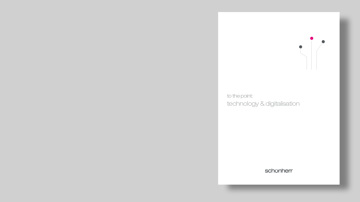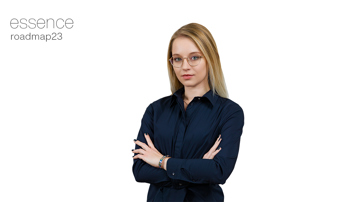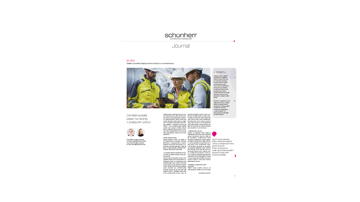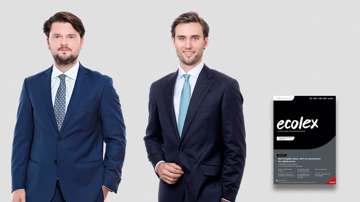Read through our technology & digitalisation articles, publications and news!
all (200)
blog (11)
newsletters (44)
publications (53)
media coverage (7)
events (25)
press releases (19)
roadmap (41)

newsletter
01 July 2025
austria bulgaria croatia slovenia hungary moldova poland türkiye
J.Böszörményi C.Biel F.Terharen M.Demirev S.Sušanj B.Darcsi G.Horváth A.Guzun V.Iurkovski D.Rutecka K.Szczudlik P.Podsiedlik K.Pikuła C.Filip Š.Lovšin M.Gajšek D.Aydoğan D.Kara E.Kuriş
Digital Law Monitor 2/2025
Keeping up with developments in digital law is an increasing challenge.
To assist you in handling this challenge, we have prepared a comprehensive (though not necessarily exhaustive) overview of recent developments, which we will update regularly. This overview covers legal developments across jurisdictions and includes legal acts, draft legal acts, guidelines and occasionally other relevant legal materials

newsletter
Digital Law Monitor
Keeping up with developments in Digital Law is an increasing challenge.
To assist you handling this challenge, we created this comprehensive (though not necessarily complete) overview of these developments and will update it on a regular basis. This overview includes legal acts, draft legal acts, guidelines and occasionally other legal materials.


newsletter
Croatia implements EU Digital Services Act
On 17 April 2025, the Law on the Implementation of Regulation (EU) 2022/2065 on the Single Market for Digital Services (the Digital Services Act or "DSA") (the "Law") entered into force in Croatia. The Law marks a significant step in harmonising the national legislation with the EU's regulatory framework for digital services.


publication
01 April 2025
D.Birnbauer G.Leissler G.Stangl D.Hofmarcher J.Böszörményi S.Müller F.Terharen A.Pabst C.Kracher D.Stahleder A.Salajan C.Biel T.Strayhammer
Artificial Intelligence in Practice



roadmap
Liability for damages: the missing piece of the AI Act puzzle
On 1 August 2024, the AI Act – the world's first comprehensive legal regulation for artificial intelligence systems and models – came into force. The purpose of this legislation is to ensure safety and compliance with European values regarding the development and use of AI. However, it does not address issues of liability. It is important to note that the AI Act is not the only legislation dealing with AI that may impact its development in the EU. Other existing or planned regulations include the EU General Data Protection Regulation (EU) 2016/679, the Product Liability Directive, which allows people harmed by software (including AI software) to seek compensation from the software manufacturer, the General Product Safety Regulation 2023/988/EU, and intellectual property laws under the national laws of EU Member States.

roadmap
Dark patterns are everywhere – and the authorities know about it
The fight against dark patterns is gaining momentum among national consumer protection authorities, actively supported by the European Union. The Digital Services Act (DSA) is just one of many ways to protect European consumers. Penalties for non-compliance can be severe and the risks for businesses are increasing. What should we expect in the future?


roadmap
New Croatian regulation on Crypto Asset Service Providers: is Croatia a prime EU hub for crypto services?
With MiCA, the EU has made significant progress in harmonising the regulatory framework for Crypto Asset Service Providers (CASPs). MiCA introduces a comprehensive set of rules designed to enhance transparency, protect consumers and uphold market integrity.

roadmap
Challenges facing banks in Poland in the digitalisation era: legal solutions and strategic advice
As Poland enters a full-scale digitalisation era, driven by the need for advanced IT systems and increased technological awareness, banks face the challenge of adapting to this rapidly evolving landscape. Technology is pushing banks toward new development paths that align with the demands of today's digital reality.

roadmap
FinTech frontier: Mapping compliance challenges and opportunities in CEE
In the rapidly evolving world of financial technology (FinTech), regulatory frameworks are crucial in shaping the industry's landscape. As FinTech companies innovate and disrupt traditional financial services, understanding the regulatory environment is essential.

roadmap
The intellectual property challenges of artworks turned into NFTs
Despite Statista's prediction of an 11.01 % decline in the global NFT market in 2024, the market is still expected to generate total revenue of USD 608.6m by 2025. According to the Virtual Market Research Report, the NFT market is projected to reach USD 152.54bln by 2030, with a compound annual growth rate (CAGR) of 34.2 % from 2024 to 2030. This indicates that the NFT market is still emerging, offering significant profit opportunities for artists selling their work as NFTs. However, exploiting NFTs also presents challenges from an intellectual property law perspective.

newsletter
Mandatory AI training for employees in the EU: your guide to compliance
Starting 2 February 2025, Art. 4 of the AI Act will require businesses to ensure their workforce is equipped with a sufficient level of artificial intelligence (AI) literacy. With AI rapidly reshaping industries, this new regulatory obligation presents both a challenge and an opportunity. Here's everything you need to know about the new AI literacy requirements and how your company can successfully meet them.

newsletter
The digital defence line: Hungary adopts comprehensive cybersecurity law
Cybersecurity is one of the most critical challenges of our time. On 17 December 2024, Hungary adopted a new law that comprehensively regulates the country's cybersecurity and implements the EU's NIS2 Directive. A milestone in Hungary's digital defence, the law came into effect on 1 January 2025.

publication
23 January 2025
J.Böszörményi C.Kracher T.Kulnigg G.Leissler D.Stahleder F.Terharen M.Woller
KI-VO



newsletter
Poland: New technologies and food traceability
Today's food industry faces many challenges in ensuring food safety, quality and sustainability. As the demand for safe, healthy and organic food continues to grow, food traceability in the process of food making becomes a key element.



press release
04 November 2024
T.Kulnigg D.Tyrybon K.Pusch C.Pretscher S.Müller F.Terharen N.Zafoschnig A.Pabst C.Unterdünhofen
Austria: Schoenherr advises Knight Capital on EUR 10m financing round for iDWELL
Schoenherr advised investment firm Knight Capital in the EUR 10m financing round of the Vienna-based company iDWELL. Specialising in the optimisation of property management through artificial intelligence, iDWELL is rapidly establishing itself as a leading player in the PropTech sector.

publication
30 October 2024
Central and Eastern Europe
CEE team
to the point: technology & digitalisation l October 2024
Welcome to the October edition of Schoenherr's to the point: technology & digitalisation newsletter!

media coverage
Training and reducing fear - This is how artificial intelligence can work in insurance
more
newsletter
AI regulation and development in Serbia
AI is developing rapidly in Serbia and numerous initiatives are emerging daily. Therefore, a working group, which includes our Schoenherr expert Marija Vlajković, is already in the process of drafting a new Law on Artificial Intelligence. The final draft is expected by spring 2025.

newsletter
Privacy concerns in web scraping: a GDPR and Serbian privacy law perspective
When developing their models, AI providers use various data sets. Sometimes these are provided by their clients, as in the case of tailor-made chatbots, and sometimes the models are trained on licensed or even publicly available data. In both situations, the data sets almost always include personal data. Thus, AI developers should carefully consider their obligations under the GDPR as well as local privacy law, depending on what applies to them.



newsletter
The status and future prospects of AI regulation and development in North Macedonia
North Macedonia currently lacks AI-specific regulations, lagging behind neighbouring countries that have implemented guidelines or laws. Although the Macedonian Fund for Innovation and Technology Development (FITD) and the government initiated efforts in 2021 to create a National Strategy for AI (National Strategy), progress has been slow due to challenges such as insufficient data, human resources, and technical capabilities. Despite this, there is a strong commitment, supported by organisations like the World Bank and UNDP, to develop a comprehensive AI strategy aligned with European Union (EU) standards.




newsletter
AI Act published in the Official Journal of the EU
The AI Act was published in the Official Journal of the EU on 12 July 2024.


publication
27 June 2024
D.Rutecka P.Podsiedlik P.Baran T.Kulnigg A.Radonjanin M.Vlajković
to the point: technology & digitalisation l June 2024
Welcome to the June edition of Schoenherr's to the point: technology & digitalisation newsletter!

newsletter
Austria: New verification requirements for website and platform operators
A judgment of the Austrian Supreme Court of Justice published on 26 April 2024 (6 Ob 210/23k) requires website and platform providers to review their processes under the DSA.

newsletter
Czech Republic: Deadline to apply DORA looms
Along with the NIS2 directive, the Digital Operational Resilience Act (DORA)[1] is an essential piece of European legislation aiming to bolster cybersecurity within the EU. Unlike the NIS2 directive, DORA aims specifically at enhancing the operational resilience of the financial sector, while establishing a comprehensive framework to ensure that all financial entities regulated under DORA can withstand, respond to, and recover from disruptions and threats related to information and communications technology (ICT).

newsletter
The state of cybersecurity regulation in the Czech Republic: NIS 2 transposition underway, deadline 17 October 2024
The NIS2 directive[1] is a landmark piece of European cybersecurity legislation, significantly impacting the cybersecurity practices and responsibilities of European businesses and organisations

press release
Austria: Schoenherr advises scale-up Storyblok on its USD 80m Series C financing
Schoenherr advised the Austrian scale-up Storyblok on its Series C financing worth USD 80m, bringing the total amount raised to USD 138m, marking the largest financing round to date this year.


publication
to the point: technology & digitalisation l May 2024
Welcome to the May edition of Schoenherr's to the point: technology & digitalisation newsletter!

press release
Eminent CEE law firm Schoenherr structurally implements Artificial Intelligence
Elite law firm Schoenherr, which has a strong presence in 14 Central and Eastern European countries, has entered a strategic partnership with Harvey, the leading generative AI platform for the legal industry, backed by OpenAI, Sequoia Capital and Kleiner Perkins.

publication
26 April 2024
D.Hofmarcher T.Kulnigg N.Kerschbaumer D.Tyrybon C.Pretscher P.Podsiedlik D.Rutecka P.Baran
to the point: technology & digitalisation l April 2024
Welcome to the April edition of Schoenherr's to the point: technology & digitalisation newsletter!


publication
21 March 2024
K.Szczudlik D.Rutecka P.Podsiedlik F.Terharen K.Pikuła P.Baran A.Radonjanin M.Vlajković N.Kerschbaumer
to the point: technology & digitalisation l March 2024
Welcome to the March edition of Schoenherr's to the point: technology & digitalisation newsletter!

media coverage
Impact of the EU AI Act on Personal Data Protection in Serbia Amidst Emerging AI Technologies
Biznis.rs | Interview with Marija Vlajković

newsletter
Successful MiCAR licensing: FMA publishes roadmap for Crypto-asset service providers
As the regulatory landscape for crypto-assets undergoes a significant transformation with the European Union's implementation of the Markets in Crypto-Assets Regulation (MiCAR, Regulation (EU) 2023/1114), attention turns to the preparatory steps entities must take to comply with these new standards. Against this backdrop, the Austrian Financial Market Authority (FMA) has recently published preliminary guidance on the MiCAR licensing process for crypto-asset service providers (CASPs). These guidelines outline the steps CASPs need to consider and the FMA's expectations in the lead-up to full MiCAR applicability after 30 December 2024.

publication
22 February 2024
D.Rutecka D.Hofmarcher D.Tyrybon N.Kerschbaumer F.Terharen K.Szczudlik K.Solarz-Włodarska P.Podsiedlik K.Pikuła
to the point: technology & digitalisation l February 2024
Welcome to the February edition of Schoenherr's to the point: technology & digitalisation newsletter!



roadmap
Consumer Credit Directive II: consumer credit legislation for the digital age
A 2020 review of the Consumer Credit Directive (2008/48/EC) ("CCD I") by the European Commission (EC) found that CCD I has been only partially effective in ensuring a high level of consumer protection.

roadmap
Moving lock, stock and barrel to the cloud: what banks need to know when negotiating with service vendors
Skimming through business journals from the last decade or so, it feels like the transition to cloud computing has been looming over the banking industry for a long time. But with so many industries now taking steps to digitalise, even the traditionally cautious banking industry is being swept up in the tide.

roadmap
More than an ID: the European Digital Identity Wallet
Electronic identity ("eID") and electronic trusted services ("eTS") are currently regulated at the EU level in the eIDAS Regulation of 23 July 2014. A decade is an eternity in the world of new technologies and the eIDAS Regulation has become outdated and unsatisfactory in many areas. One of its biggest failings is in the true interoperability and cross-border recognition of national eID schemes.

roadmap
Key implications of the NIS 2 Directive: increased liability risk for management and broader scope
The revision of the NIS Directive (EU) 2016/1148 ("NIS 1") was published on 27 December 2022 in the form of Directive (EU) 2022/2555 ("NIS 2") and entered into force on 16 January 2023. NIS 2 is the Commission's response to Member States' inconsistent and fragmented implementation of NIS 1. The revision of this first EU-wide cybersecurity legislation will mean significant and far-reaching changes for companies in "critical" sectors.

roadmap
Staying compliant in a digital world: why companies should take note of AI
In an era of rapid technological advancement, businesses face an ever-evolving regulatory landscape.


roadmap
Patent litigation in Austria: how lawyers can help
Patents are exclusive rights relating to inventions. Patent registrations grant a time-limited monopoly to apply the patented technology. While they are a powerful weapon in maintaining and defending the competitive edge of technology-driven businesses, third-party patents may pose a threat to products and businesses. This calls for the involvement of specialised patent lawyers and patent attorneys.

roadmap
Regulating facial recognition technologies: is your face too personal?
Biometric technology, especially facial recognition, has taken off in recent years. From airport security to simply unlocking a smartphone, facial recognition is now a fixture in everyone's lives. Biometric tools are also becoming more and more popular with commercial brands and have proven to be an intriguing marketing tactic (a well-known pizza chain offering food recommendations based on how an AI reads human moods is both fascinating and troubling).

roadmap
Building Information Modelling: a Montenegrin perspective
Building Information Modelling (BIM) is a comprehensive methodology and process that enables the creation of dynamic, three-dimensional computer models for construction facilities. BIM streamlines the production and use of project documentation, improves timeline and budget accuracy, and enhances communication and decision-making.


publication
to the point: technology & digitalisation l January 2024
Welcome to this year's first edition of Schoenherr's to the point: technology & digitalisation newsletter!



publication
21 December 2023
G.Leissler T.Kulnigg N.Kerschbaumer D.Tyrybon M.Czernin F.Terharen U.Rath D.Rutecka
to the point: technology & digitalisation l December 2023
Welcome to the December edition of Schoenherr's to the point: technology & digitalisation newsletter!

press release
Montenegro: Schoenherr advises Montenegro Chamber of Commerce on its first digitalisation project
Moravčević Vojnović and partners in cooperation with Schoenherr advised the Montenegro Chamber of Commerce, the largest business organisation in the country, on its innovative "eKomora" project, the institution's first digitalisation project.

publication
to the point: technology & digitalisation l November 2023
Welcome to the November edition of Schoenherr's to the point: technology & digitalisation newsletter!


publication
31 October 2023
N.Kerschbaumer D.Tyrybon M.Schmiedinger C.Pretscher M.Vlajković M.Pressler D.Rutecka
to the point: technology & digitalisation l October 2023
Welcome to the October edition of Schoenherr's to the point: technology & digitalisation newsletter!



publication
28 September 2023
A.Hirsch N.Kerschbaumer D.Tyrybon F.Terharen M.Vlajković D.Rutecka
to the point: technology & digitalisation l September 2023
Welcome to the September edition of Schoenherr's to the point: technology & digitalisation newsletter!

event
Finding the perfect blend of legal service and (AI-powered) legal tech
25 October 2023 | Bucharest


newsletter
Bridging the gap between Serbian regulations and the GDPR: Serbia's Data Protection Strategy unveiled
In late August 2023, at the initiative of Serbia's Data Protection Commissioner (the "Commissioner"), the Government of Serbia adopted the Data Protection Strategy for the 2023-2030 period (the "Strategy").

blog
The EU Digital Services Act: 19 designated online platforms have completed their last-minute compliance preparations, Serbia is just looking over its shoulder
While most provisions of the EU Digital Services Act ("DSA") will not begin to apply until February 2024, the EU Commission has nevertheless designated 19 "very large online platforms" and "very large search engines" – so-called gatekeepers – for which the strictest rules under the DSA took effect on 25 August this year.

press release
Austria: Schoenherr advises Thoma Bravo portfolio company J.D. Power on acquisition of Autovista Group
Schoenherr advised, alongside lead counsel Kirkland & Ellis, London, Thoma Bravo's portfolio company J.D. Power, a global leader in data analytics, on the acquisition of the leading pan-European and Australian automotive data, analytics and industry insights provider Autovista Group.

event
IBA CEE Conference – The Future of Legal Management
22 September 2023 | Intercontinental Athénée Palace, Bucharest

newsletter
Third time's the charm? EU-US Data Privacy Framework revamped and reloaded
On 10 July 2023, the European Commission adopted an adequacy decision for a lawful data transfer from the EU to the USA for the third time. [1] This means that personal data may again be lawfully transferred to the US. This will facilitate the use of US service providers for EU companies.


publication
27 June 2023
K.Zmatlíková M.Voldánová P.Korál H.Hangler A.Prochazka J.Kupčík M.Svoboda N.Dubská
CZ: Schoenherr Journal Edition 14
The Schoenherr Journal, published by Schoenherr's Prague office, examines the latest important legal developments in the Czech Republic.

press release
26 June 2023
T.Kulnigg N.Kerschbaumer M.Czernin C.Haid T.Dabsch M.Thorbauer C.Rainer T.Waidmann T.Hayden A.Pabst N.Zafoschnig D.Tyrybon Y.Kraudinger
Austria: Schoenherr advises Audiotonix Group on acquisition of sonible GmbH
Schoenherr advised the Audiotonix Group, a global market leader in the design, engineering and manufacture of professional audio mixing consoles, on the acquisition of sonible GmbH, an Austrian start-up specialised in developing AI-assisted audio plug-ins and 3D audio systems.


publication
28 April 2023
T.Kulnigg N.Kerschbaumer D.Tyrybon D.Rutecka M.Vlajković F.Terharen G.Leissler
to the point: technology & digitalisation l April 2023

newsletter
MiCAR: Final steps towards the legal framework for crypto-assets
On 20 April 2023 the European Parliament ("EP") finally approved the regulation on markets in crypto-assets ("MiCAR").

newsletter
Serbia adopts ethics guidelines for artificial intelligence
On 23 March 2023, the Serbian government adopted Ethics Guidelines for the Development, Implementation and Use of Reliable and Responsible AI ("Guidelines"), which may be seen as yet another step in the process of harmonising Serbia's legislative framework with the European Union, following the Proposal for an AI Regulation announced by the EU Commission two years ago. The Guidelines largely rely on UNESCO's Recommendation on the Ethics of AI adopted in 2021, which Serbian representatives also helped create. Since the EU is awaiting its regulatory framework on AI, Serbia took the first step down this road as well.

publication
31 March 2023
T.Kulnigg N.Kerschbaumer D.Tyrybon G.Irsa-Klingspiegl D.Rutecka A.Pabst M.Vlajković A.Hirsch
to the point: technology & digitalisation l March 2023

blog
GPT-4 shows the ever-increasing importance of legal considerations pertaining to AI
Generative AI has made quantum leaps in the last year. Aside from multiple text2 image models there are large language models producing largely accurate and convincing texts in reply to prompts provided by a user. In November last year OpenAI made available the functionality of their vast 175 billion parameter model GPT-3.5, which was fine-tuned to interpret prompts formulated as questions. ChatGPT is a turning point in the public perception of AI, as it provided compelling texts with comparatively high factual accuracy.

blog
North Macedonia: The Data Protection Act and enforcement challenges
After the adoption of the General Data Protection Regulation of the European Union (EU) 2016/679 ("GDPR"), as an obligation based on the Stabilisation and Association Agreement between EU and North Macedonia, a new data protection regime was adopted. Since 2020, the matter of personal data protection in the Republic of North Macedonia is regulated by the new Act on Personal Data Protection (Official Gazette of the Republic of North Macedonia, nos. 42/20, 294/21) ("LPDP"), effective as of 24 February 2020.

blog
Serbia incentivises start-up-ecosystem
To attract investors in the area of innovation technologies, Serbia has adopted a set of subsidies relating to employees' salaries and corporate income taxes. In recent years, the country has set its sights on being one of the largest European hubs for EU and overseas IT companies using talented IT workforce only as an outsourcing service supplier while retaining actual project development in the countries of capital origin. This is seen as an opportunity to motivate foreign IT companies doing business in Serbia not only to shift their operations to Serbia on a larger scale, but to tie IP rights on their tech products to their affiliated Serbian companies.

publication
28 February 2023
N.Kerschbaumer D.Tyrybon M.Czernin T.Kulnigg M.Woller M.Schmiedinger D.Rutecka M.Neagu B.Kapeller-Hirsch
to the point: technology & digitalisation l February 2023

blog
The Omnibus Directive: key objectives and national implementation
The Omnibus Directive (Directive (EU) 2019/2161), also referred to as the "Enforcement and Modernisation Directive", is aimed at strengthening consumer protection and enhancing enforcement measures as the world gears up for the digital age. Recognising the increased use of online platforms and marketplaces, it encourages Member States to adopt specific measures to maintain a high level of consumer protection, including in these channels.










publication
31 January 2023
T.Kulnigg M.Czernin D.Hofmarcher S.Khalil M.Neagu M.Nusser M.Pressler D.Rutecka A.Tipotsch
to the point: technology & digitalisation l January 2023

blog
Key legal topics in data centre development and investments
The recent years' sprint towards digitalisation was one of the decisive factors in accelerating the transformation of telecommunications infrastructure. The global markets expect an increase in investments in telecom infrastructure and Romania is no exception.

press release
Austria: Schoenherr advises proptech scale-up GROPYUS on major Austrian scale-up financing round
Schoenherr advised the Vienna-headquartered property technology scale-up GROPYUS on its ongoing Series B financing round led by Vonovia, Europe's largest residential real estate company. The volume of this financing round is at around EUR 100m, bringing GROPYUS' total funding to date to more than EUR 200m.



publication
CZ: Schoenherr Journal Edition 13
The Schoenherr Journal, published by Schoenherr's Prague office, examines the latest important legal developments in the Czech Republic.


publication
24 November 2022
D.Tyrybon C.Pretscher T.Kulnigg C.Haid F.Terharen N.Kerschbaumer D.Rutecka D.Hofmarcher M.Vlajković
to the point: technology & digitalisation l November 2022

newsletter
Bulgaria paves way for innovative businesses with new start-up visa
Country welcomes non-EU investors to boost local start-up ecosystem
After Decree No 318 of 7 October 2022 adopting the Ordinance on the conditions and procedure for issuing, extending and revoking a certificate for a high-tech and/or innovative project (the "Ordinance") was promulgated in issue 82 of the State Gazette of 14 October 2022, Bulgaria joins the almost half of EU countries that issue "start-up visas".




newsletter
NFT licences that "can't be evil": are they any good?
Licences connected to Non-Fungible Tokens (NFTs) are still far from being the norm. As a result, most NFTs still do not convey sufficient or appropriate IP rights to their underlying content. Moreover, they have to deal with practical difficulties inherent to the nature of NFTs. The need for licences tailored to the NFT market is therefore evident.
To overcome the practical difficulties and tackle these issues, publicly available NFT licence systems have emerged. But are they any good?

press release
16 August 2022
I.Stoyanov S.Tsekova K.Kaloyanova-Toshkova V.Tomov G.Roussinova-Ivanova A.Lazarevska
Bulgaria: Schoenherr advises KKCG and Aricoma Group International on acquisition of Musala Soft
Schoenherr advised the KKCG Group (KKCG) and its portfolio company Aricoma Group International AB (Aricoma) on the acquisition of Musala Soft, a major Bulgarian software company, and its subsidiaries.

newsletter
EU: Commission Proposal to implement the FATF Travel Rule: Speed bumps ahead for crypto-asset transfers?


press release
Austria: Schoenherr advises Red Bull on joint venture with Teletest consortium
Schoenherr advised Red Bull GmbH on the establishment of a joint venture with Arbeitsgemeinschaft Teletest ("AGTT").

blog
Trademarks: The classification of "virtual goods" in trademark applications
Trademark professionals have noted growing interest in protecting trademarks for "virtual goods". This leaves trademark specialists as well as IP offices grappling with how to correctly classify these goods.


press release
Austria: Schoenherr advises Storyblok on USD 47m Series B financing
Schoenherr advised the Austrian scale-up Storyblok on its Series B financing worth USD 47m, one of several major transactions in the Austrian start-up scene on which Schoenherr has advised in the recent past.



press release
Austria: Schoenherr advises S&T AG on voluntary partial public takeover offer
Schoenherr advised S&T AG, an Austrian company listed on the Frankfurt Stock Exchange, in connection with the voluntary partial public takeover offer by grosso tec AG (Germany) on issues of Austrian law. Hogan Lovells advised S&T AG on German law issues.

publication
15 March 2022
M.Woller D.Tyrybon M.Schmiedinger D.Rutecka L.Dočekalová M.Pressler F.Terharen A.Reumann
to the point: technology & digitalisation l March 2022




event
Wegfall des "Privacy Shield": Kommt jetzt das Aus für "Google Analytics"?
Webinar | Schoenherr Privacy Academy
3. März 2022 | 9.30 - 10.30 Uhr


publication
10 February 2022
T.Kulnigg D.Tyrybon C.Haid A.Reumann F.Terharen D.Rutecka V.Iurkovski N.Kerschbaumer M.Czernin
to the point: technology & digitalisation l February 2022

press release
03 February 2022
A.Doytchinova S.Pavlova-Kaneva V.Tomov G.Roussinova-Ivanova K.Bozhinova L.Dočekalová H.Hangler
Bulgaria: Schoenherr advises Chaos on Bulgarian law aspects in merger with Enscape
Schoenherr advised Chaos, a global leader in photorealistic rendering technology, on the Bulgarian law aspects of its merger with Enscape, a leading developer of real-time rendering and design workflow technology for the Architecture, Engineering and Construction (AEC) industries.

event
Wegfall des "Privacy Shield": Kommt jetzt das Aus für "Google Analytics"?
Webinar | Schoenherr Privacy Academy
2. Februar 2022 | 17.00 - 18.00 Uhr & 3. März 2022 | 9.30 - 10.30 Uhr

newsletter
Moldova: Digitalisation has made it easier to establish, operate and sell companies
Through its 11 November 2021 law ("Law 175/2021"), the Moldovan Parliament passed certain amendments to existing legislation with the goal of digitalising the national economy. As a result, the norms implemented have made it simpler to establish, operate and sell companies in Moldova.
Law 175/2021 entered into force on 10 January 2022.

press release
Austria: Schoenherr advises Austrian unicorn Bitpanda on expansion of its product portfolio to include exchange traded cryptocurrencies
Schoenherr advised the Austrian fintech Bitpanda on the expansion of its product portfolio to include exchange traded cryptocurrencies. This product provides investors with easy access to crypto assets via a liquid financial instrument traded on a regulated exchange.


roadmap
Judgments issued ex machina? Are AI-made judicial decisions the future?
Digitalisation is invading all areas of our lives, including the judiciary. It is impossible to imagine everyday legal life without electronic legal transactions, the electronically managed land and company registers, the edict file or the possibility of submitting briefs to courts in electronic form.


roadmap
Coming soon: The European Patent with Unitary Effect
The European Patent with Unitary Effect ("Unitary Patent") already has a longstanding and ambiguous history, although its underlying legal framework has not yet come into force. But 2021 brought a considerable push towards implementation of the Unitary Patent system.


roadmap
The Digital Content Directive and the Sale of Goods Directive: when to apply which?
The constant and growing development of new technologies is leading towards an increasing availability of various digital products for consumers. This, in turn, triggers competitiveness and consumers' ever-greater expectations about the offerings, the ease of their purchase and conclusion of contracts without leaving home.


roadmap
Does the Digital Services Directive stipulate a right to updates?
The new Digital Services Directive (DSD) aims to harmonise certain aspects of consumer protection law by providing consumers a mandatory warranty for digital content and digital services supplied by a vendor. First and foremost this concerns contracts on the purchase or rental of software (usually comprising licence agreements) or cloud services.




roadmap
Evidence no. 5. How to sniff out cybercrimes and build a successful case
More and more companies are being subjected to cyberattacks. To effectively respond to this criminal phenomenon, it is essential to be prepared, meaning making sure you have solid evidence to build a criminal case.

media coverage
Wie man ein 64-kg-Kunstwerk als NFT verkauft
Derzeit besteht ein regelrechter Run auf digitale Kunstwerke, deren Einmaligkeit durch „Non-Fungible Token“ (NFT) garantiert ist. Das gute alte ABGB ermöglicht es, diese Technologie für körperliche Schöpfungen zu nutzen.



media coverage
Non-Fungible Tokens: Ist digitale Kunst versicherbar?
Digitale Kunstwerke in Form von Non-Fungible Tokens (NFTs) erzielen bei Auktionen Millionenpreise. Für Sammler stellt sich daher die Frage, ob sie die Werke versichern können


newsletter
FMA permits automated biometrical customer identification – a game changer for the KYC process?

publication
Cultural Hackathon podcast: NFT – Is it worth it?
The NFT art market is growing and occupying the cultural sector.



publication
19 October 2021
T.Kulnigg G.Leissler J.Böszörményi F.Terharen D.Rutecka D.Tyrybon M.Czernin M.Pressler
to the point: technology & digitalisation | October 2021


newsletter
Limited network exemption under PSD2 – EBA consults on Draft Guidelines
In summer 2021 the European Banking Authority (EBA) published Draft Guidelines on the limited network exemption (LNE) under the Payment Service Directive 2 (PSD2) for consultation (available here). The Draft Guidelines are meant to foster supervisory convergence amongst the EU's national competent regulators (NCAs).



media coverage
Dissonant Optimism: Mergers and Acquisitions in the Bulgarian Technology Industry

press release
Austria: Schoenherr advises on the sale of the oral hygiene start-up Playbrush to the Sunstar Group
Schoenherr advised the shareholders of the Austrian oral hygiene start-up Playbrush on the sale of the majority shares to the international health care company Sunstar Group.

event
IP-Day 2021
IP-Day is dedicated to current and fundamental questions regarding intellectual property law – not just in an academic way, but also practically.


press release
Austria: Schoenherr advises Bitpanda on Austria's largest scale-up financing round
Schoenherr provided legal advice to Bitpanda on the largest scale-up financing round in Austria to date.




newsletter
Blockchain and (Un)Real Estate
Blockchain technology has – so far – not lead to a transfer of the world's land registers onto this technology or to a "tokenization" of title (documents). The only significant exception in this respect is Georgia where a purchaser's title to real property can be registered by execution of a smart contract.

newsletter
NFT art: The most important (legal) questions for artists, buyers in general and museums


press release
Bulgaria: Schoenherr advises Ringier on the acquisition of Sportal Media Group and Digital Ventures
Schoenherr advised Swiss-based media company Ringier on the acquisition of a majority stake in the leading Bulgarian sports news portal – Sportal Media Group – and an affiliated IT company behind the leading international Sports Content Management System, Sportal365 – Digital Ventures OOD.






event
NFT: An all-round legal view of Non-Fungible Tokens | Webinar
Did you miss our webinar, or do you want to listen to the discussed topics again? Watch the NFT webinar video recordings here!

newsletter
When a museum buys an NFT: Legal challenges and considerations
The story of our NFT self-experiment does not end with the selling of the token. To the contrary, it is only the start: The buyer – in our case the Museum Francisco Carolinum in Linz – wants to use the artwork for their purposes. In general, what legal considerations should a museum keep in mind?

publication
14 June 2021
S.Khalil C.Cudlik T.Kulnigg G.Leissler A.Natterer A.Tipotsch F.Terharen D.Tyrybon N.Stepan
to the point: technology & digitalisation | June 2021











